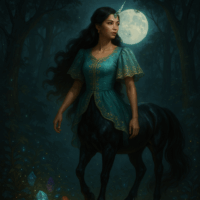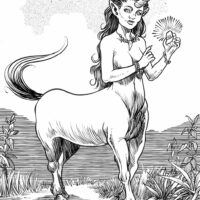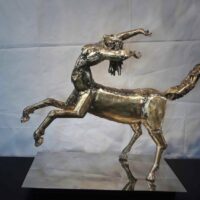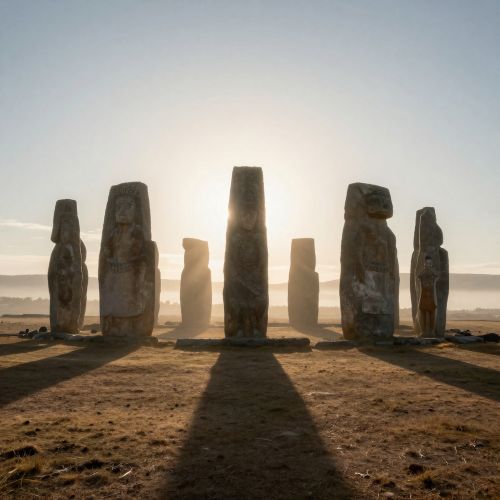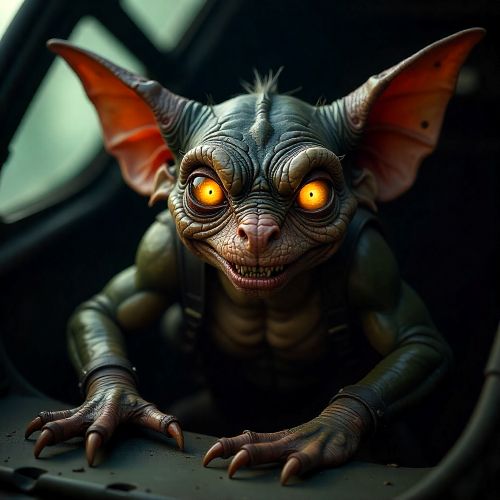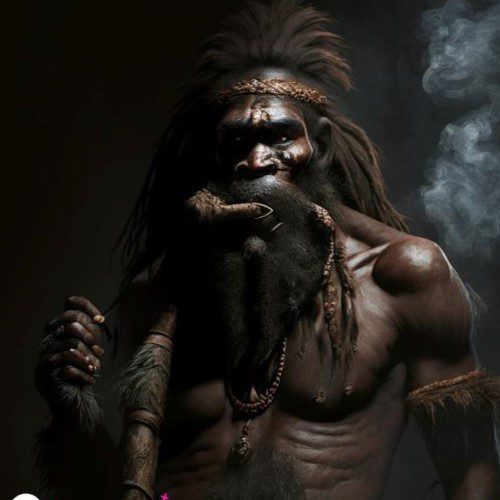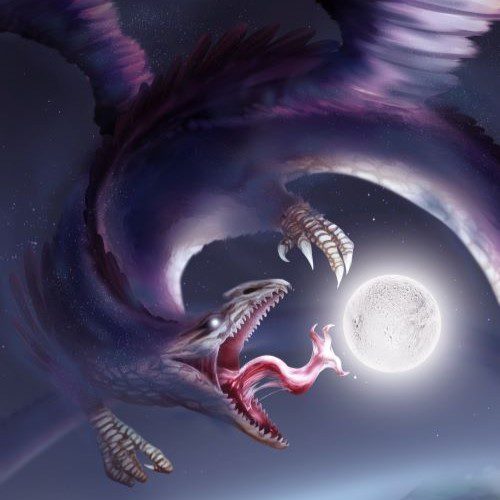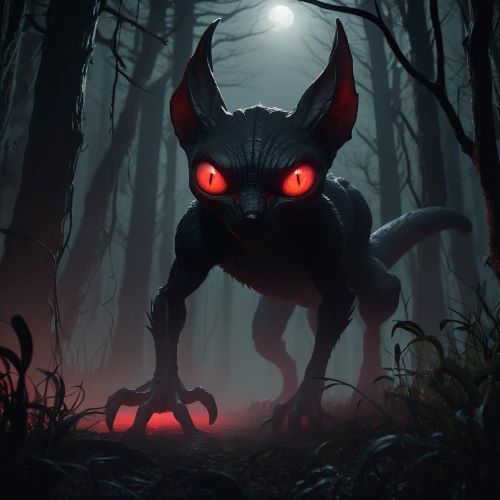Anggitay : The Enigmatic Centauride
Listen
At a glance
| Description | |
|---|---|
| Origin | Philippine Mythology |
| Classification | Hybrids |
| Family Members | N/A |
| Region | Philippines |
| Associated With | Shapeshifting, Luck |
Anggitay
Introduction
In the rich and layered world of Philippine mythology, the Anggitay stands out as a captivating symbol of both mystery and grace. This half-woman, half-horse creature draws comparisons to the Greek centauride, yet remains firmly rooted in the distinct storytelling traditions of the Philippines. With tales passed down through generations, the Anggitay embodies a powerful blend of feminine beauty and natural wildness. Often appearing in pre-colonial oral lore, she is regarded not only as a magical being but also as a cultural figure that bridges human consciousness and the spirit world, embodying the complexity and richness of indigenous Filipino belief systems.
Physical Traits
The Anggitay is instantly recognizable due to her unique hybrid form: the upper body of an alluring woman seamlessly transitioning into the lower half of a horse. She is frequently portrayed with flowing black hair, glistening brown skin, and adorned in traditional attire like the baro’t saya, reinforcing her connection to Filipino identity. In some versions of the myth, she bears a singular horn on her forehead, akin to a unicorn, especially during rare natural occurrences like a sunshower. Her equine form represents not only strength and freedom but also a connection to nature’s raw energy. Her human aspect adds an air of intelligence and sensuality, creating a fusion of wild instinct and cultivated grace that is central to her myth.
Family
While the Anggitay is not tied to a specific family tree in Philippine mythology, she is widely understood as the female counterpart of the Tikbalang, a mischievous, horse-headed creature known for leading travelers astray. This juxtaposition suggests a mythological balance—where the Tikbalang symbolizes disorder and illusion, the Anggitay often embodies calmness and guidance. Stories often depict her as residing in lush forests, particularly in regions like Santo Tomas, Batangas. Unlike her male counterpart, who thrives on trickery, the Anggitay is portrayed as nurturing, sometimes aiding lost wanderers or acting as a guardian of sacred natural spaces.
Other names
The Anggitay is sometimes referred to as the Philippine centauride, emphasizing her resemblance to the Greek female centaurs. Yet despite surface similarities, she is an entirely indigenous figure shaped by the unique cosmology of Filipino folklore. Across cultures, beings like her do appear—the Greek centauride with their warrior traits, the Scottish Kelpie with its equine magic and deception, and the animal-empowered Hindu goddess Durga, who channels feminine power and natural symbolism. These parallels show that hybrid beings with both human and animal aspects are archetypes that transcend borders, but the Anggitay remains a distinct product of Filipino imagination, deeply embedded in its regional lore and natural landscapes.
Powers and Abilities
The Anggitay is endowed with a suite of mystical abilities that elevate her above a mere folkloric curiosity. She is believed to possess shapeshifting powers, allowing her to take full human form when interacting with mortals. This ability enables her to move between realms, blending into human society or vanishing into the wilderness at will. Her connection to nature is another key feature—legends describe her as able to communicate with animals and plants, making her a spiritual custodian of forests and rivers.
Some myths suggest that encountering an Anggitay brings fertility and prosperity, making her a symbolic bringer of abundance. She is also known for her magnetic attraction to precious stones and gemstones, and tales often recount her being drawn to places where such treasures are hidden. While these magical elements set her apart, what’s particularly compelling is her demeanor—she is seldom aggressive. Rather, she serves as a quiet force of protection, wisdom, and healing.
Modern Day Influence
Despite being a creature of myth, the Anggitay has found a place in modern Filipino consciousness, thanks in part to a growing interest in reviving indigenous culture. Writers, artists, and educators have been instrumental in ensuring her presence endures. In literature, references to the Anggitay appear in works exploring Filipino myths and folktales, often positioning her as a symbol of hidden wisdom and feminine mystique. Digital and traditional artists have portrayed her through paintings and illustrations that merge pre-colonial motifs with contemporary aesthetics, reviving her image for younger audiences.
On screen, while she is not as frequently depicted as some other mythological creatures, shows like Encantadia have set a precedent for myth-inspired storytelling in Philippine media. The Anggitay’s likeness has also influenced fantasy games, role-playing characters, and collectible art, often appearing as a guardian or a powerful magical entity. Online communities dedicated to folklore preservation, such as The Aswang Project and Sinaunang Panahon, highlight her significance and continue to educate audiences about her origins and symbolism.
In the broader scope of cultural identity, the Anggitay represents a fascinating convergence of pre-Hispanic animism, femininity, and ecological balance. Her narrative underscores a spiritual relationship between humans and nature—a theme that resonates with modern environmental and feminist discourses. As Filipino creatives and scholars revisit and reinterpret these myths, the Anggitay remains not only relevant but also a beacon of the rich mythological tradition of the Philippines.
Related Images
Source
Casocot, I. R. (2011). The Aswang Chronicles. Visprint.
de las Casas, D., & Consuegra, J. (2011). Tales from the 7,000 Isles: Filipino Folk Stories. Greenwood.
Jocano, F. L. (1969). Philippine Mythology. Capitol Publishing House.
Owens, E. A. (2022). Ang Pusong Sagrada: Character Design. ArtStation. https://www.artstation.com/artwork/9Nga1L
Sinaunang Panahon. (2024). Anggitay: Philippine Mythological Creature. https://sinaunangpanahon.com/anggitay-philippine-mythological-creature/
The Aswang Project. (2016). A Compendium of Creatures from Philippine Folklore & Mythology. https://www.aswangproject.com
Wikipedia contributors. (2024). Anggitay. Wikipedia. https://en.wikipedia.org/wiki/Anggitay
Frequently Asked Questions
What is lorem Ipsum?
I am text block. Click edit button to change this text. Lorem ipsum dolor sit amet, consectetur adipiscing elit. Ut elit tellus, luctus nec ullamcorper mattis, pulvinar dapibus leo.
What is lorem Ipsum?
I am text block. Click edit button to change this text. Lorem ipsum dolor sit amet, consectetur adipiscing elit. Ut elit tellus, luctus nec ullamcorper mattis, pulvinar dapibus leo.
What is lorem Ipsum?
I am text block. Click edit button to change this text. Lorem ipsum dolor sit amet, consectetur adipiscing elit. Ut elit tellus, luctus nec ullamcorper mattis, pulvinar dapibus leo.
What is lorem Ipsum?
I am text block. Click edit button to change this text. Lorem ipsum dolor sit amet, consectetur adipiscing elit. Ut elit tellus, luctus nec ullamcorper mattis, pulvinar dapibus leo.
What is lorem Ipsum?
I am text block. Click edit button to change this text. Lorem ipsum dolor sit amet, consectetur adipiscing elit. Ut elit tellus, luctus nec ullamcorper mattis, pulvinar dapibus leo.


